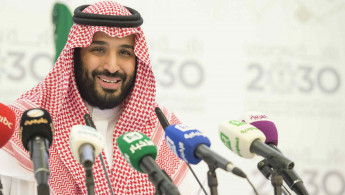The great Saudi 'sheikh-down' sees thousands of bank accounts frozen
Now, Saudi Arabia is doing both.
On Tuesday, Saudi Arabian banks froze more than 1,200 accounts belonging to individuals and companies in the kingdom, part of Crown Prince Mohammed bin Salman's ongoing purge.
Dozens of royal family members, officials and business executives have been detained in MBS' power and money grab and are facing allegations of money laundering, bribery, extorting officials and taking advantage of public office for personal gain.
Critics say the anti-corruption push is political and is meant to force many of these leading figures to hand over their assets to the crown prince and his cronies.
Since Sunday, the central bank has been expanding the list of accounts it is requiring lenders to freeze on an almost hourly basis, one regional banker told Reuters.
The banker did not name the companies affected but said they included listed and unlisted firms across many sectors.
|
He added that if the freezes stayed in place for long, they could start to hurt day-to-day business activities such as paying staff and creditors or making other transactions.
A second banker told Reuters, however, that most of the frozen accounts belonged to individuals rather than companies, and that the regulator was allowing banks to continue funding existing commitments.
A central bank spokesman was not available to comment.
Among top business executives detained in the probe are billionaire Prince Alwaleed bin Talal, chairman of investment firm Kingdom Holding; Nasser bin Aqeel al-Tayyar, founder of Al Tayyar Travel; and Amr al-Dabbagh, chairman of builder Red Sea International.
The stocks of all three companies, which have issued statements saying they continue to operate as normal, plunged between nine and 10 percent on Tuesday.
“It’s almost the equivalent of arresting Bill Gates to have Prince Alwaleed bin Talal under arrest,” Robert Jordan, former US ambassador to Saudi Arabia, told Bloomberg TV on Monday.
A genuine push against corruption would add to the credibility of Prince Mohammed’s push to prepare the economy for the post-oil era, including selling a stake in Saudi Aramco and bolstering non-oil revenue, he said.
“If it turns out to simply be a power grab, then I think it’s going to hurt the Saudis in the long run, and certainly hurt this crown prince,” Jordan added.
One of the bankers speaking to Reuters said the central bank had met with some foreign banks this week to reassure them that the freezing of accounts targeted individuals, and that firms linked to those people would not be damaged.





 Follow the Middle East's top stories in English at The New Arab on Google News
Follow the Middle East's top stories in English at The New Arab on Google News


